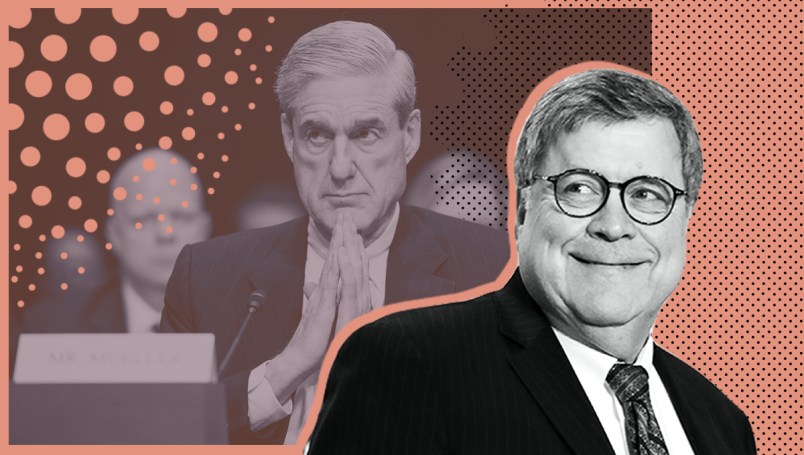All the facts are there. Cursing, pettiness, and allegedly obstructive acts abound in Special Counsel Robert Mueller’s 448-page report.
But as Mueller and his team have now impressed upon the world, per a Justice Department Office of Legal Counsel Opinion, the special counsel could lay out a detailed obstruction of justice case against President Trump — but could not consider whether the President broke the law.
Legal scholars told TPM that this apparent paradox comes down in part to the fact that Mueller is the first special counsel to operate under an OLC opinion that forbids prosecutors from charging a sitting president, and in part to the fact that it’s a murky, rarely tested area of constitutional law.
Mueller addressed this apparent paradox at his surprise Wednesday press conference, saying that as long as indicting a sitting president was banned under DOJ policy, he could not make a determination on accusing the President of obstruction because it would violate principles of fairness.
“If we had had confidence that the president clearly did not commit a crime, we would have said so,” Mueller said. “We did not, however, make a determination as to whether the President did commit a crime.”
“It would be unfair to potentially accuse somebody of a crime when there can be no court resolution of the actual charge,” Mueller added.
The OLC opinion was predated by widespread belief in the legal community that a sitting president could not be indicted and a Watergate-era DOJ determination on the issue, but it was not formally issued until October 2000.
Georgetown Law Professor Susan Bloch, who testified at 1990s Senate hearings on whether a sitting president could be indicted, told TPM that Mueller found himself in “totally uncharted territory.”
“It’s the first time we’ve had a president looking like he’s done something criminal since that OLC position was taken,” she added, saying it was the first time the opinion had to be “utilized.”
Jens David Ohlin, a law professor at Cornell, told TPM that the distinction Mueller drew between laying out the evidence leading to a charge and concluding that a charge was warranted was “incredibly formalistic.”
“It’s a one-way ratchet,” Ohlin said. “Under this view, the DOJ can say he didn’t engage in wrongdoing, but they can’t accuse the president of wrongdoing, so it only goes one way.”
At his press conference, Mueller said that much of his reasoning came down to “principles of fairness.”
Anyone who faces criminal charges from the government deserves a hearing before an impartial judge and jury of their peers. Accusing Trump of obstruction in the report while being unable to indict him would have unfairly deprived him of this right, the thinking goes.
Instead, Mueller said that his office “did not exonerate” Trump, but found that it could not take a definitive position on whether the President violated the law.
Different legal experts that TPM spoke with agreed that Mueller faced a legal gray area in deciding the issue.
Two previous special counsels have considered this issue in depth, albeit in different ways.
During the Watergate scandal, special prosecutor Leon Jaworski wrote a so-called “roadmap” that outlined a patch to impeaching President Richard Nixon.
Stanford Law Professor David Alan Sklansky called Jaworski’s approach relatively “bare-bones,” as opposed to that of Clinton-era special counsel Ken Starr, who attempted to lay out for Congress his view of the President’s impeachable offenses.
“I wasn’t sure how Mueller was gonna handle it,” Sklansky said. “It’s been handled in different ways by different special counsels.”
Attorney General Bill Barr told CBS that Mueller “could’ve reached a conclusion.”
“The opinion says you cannot indict a president while he is in office, but he could’ve reached a decision as to whether it was criminal activity. But he had his reasons for not doing it,” Barr said in the interview.
Either way, thanks to the ban on bringing charges against a sitting president, any decision about how to resolve the obstruction allegations would likely devolve to Congress.
Rick Pildes, a professor of constitutional law at NYU Law School, told TPM that the DOJ policy did not prevent the special counsel from “inform[ing] Congress of its conclusion that the President has committed a crime.”
He went on to accuse Mueller of “abdicat[ing] his core responsibility.”
“Our best opportunity in our hyper-polarized era for generating any kind of consensus on whether the President has broken the law is a definitive judgment, one way or the other, from an independent special counsel investigation,” Pildes told TPM. “That is one of the central points of initiating such an independent investigation.”






